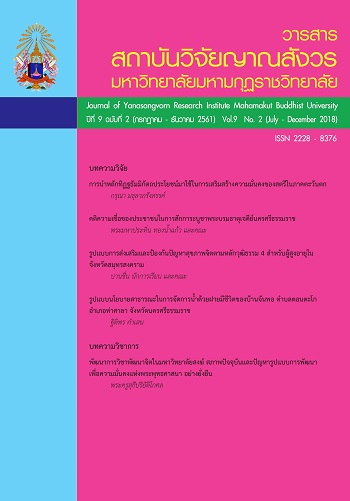ACADEMIC LEADERSHIP DEVELOPMENT SYSTEM FOR THE ADMINISTRATORS OF PRIVATE TECHNOLOGY AND VOCATIONALCOLLEGE
Main Article Content
Abstract
The objective of this research were to (1) Study the needs for academic leadership development system for the administrators of private technology and vocational colleges, (2) develop the components of the academic leadership development system, (3) evaluate the academic leadership development system. This research was divided into 3 phases; 1. Synthesis of related research theories and the need for academic leadership development system for administrators of private technology and vocational colleges, 2. Framework for the development of academic leadership, based on expert opinion by Focus Groups and develop academic leadership development system, 3. Evaluate the quality of academic leadership development system by experts. The research tools consisted of (1) A 5-level rating scale questionnaire (2) Expert rating form and (3) Expert opinion questionnaire. Statistics used in data analysis were percentage, mean and standard deviation. Major Findings: On systems components:The leadership development system components consist of (1) Context comprising analyzing physical and social environment;(2) Inputs of leadership’s competencies comprising academic affairs, curriculum and instruction management; (3) Process comprising system logical steps consist’s of capability analysis and pedagogy guidelines for the developing leadership development system; 4) Outcomes comprising outputs and performance analysis; and(5) Feedback comprising impacts assessment analysis after implementation of the system conductive.On systems procedure: There are six logical steps for Academic Leadership Development Process System; namely (1) Conduct needs assessment; (2) Plan, prepare and produce course packs; (3) Conduct pre-assessment; (4) Implement the leadership development system; (5) Conduct post- evaluation and (6) Maintain the system. 3) On senior experts verification; the system was verified at the Highly Agreeable level. (µ=4.38)
Article Details
References
จินตนา ศรีสารคาม. (2554). การวิจัยและพัฒนาโปรแกรมพัฒนาภาวะผู้นำทางวิชาการในสถานศึกษาขั้นพื้นฐาน. วิทยานิพนธ์ปริญญาดุษฏีบัณฑิต สาขาการบริหารการศึกษา บัณฑิตวิทยาลัย, มหาวิทยาลัยขอนแก่น.
ชัญญา อภิปาลกุลและคณะ. (2545).รูปแบบการพัฒนาผู้บริหารสถานศึกษาเพื่อปฏิรูปการเรียนรู้ในสถานศึกษา SINTPAE Model.รายงานการวิจัยและพัฒนาสำนักงานคณะกรรมการการศึกษาแห่งชาติ สำนักนายกรัฐมนตรี
ชลธนวรรณ ตรียพงษ์. (2553). คุณลักษณะภาวะผู้นำผู้บริหารอาชีวศึกษาตามความคิดเห็นของครูผู้สอนจังหวัดระยองจันทบุรีตราด. วิทยานิพนธ์การบริหารการศึกษาจันทบุรี, มหาวิทยาลัยราชภัฎรำไพพรรณี
นริศ แก้วสีนวล. (2556).การพัฒนารูปแบบการบริหารวิชาการในสถานศึกษาอาชีวศึกษาของรัฐมหาวิทยาลัยอิสเทิร์นนครินทร์
บุญชม ศรีสะอาด.(2545)การวิจัยเบื้องต้น. พิมพ์ครั้งที่ 7. กรุงเทพฯ สุวีริยาสาส์น
ปรียาพร วงศ์อนุตรโรจน์.(2553).การบริหารงานวิชาการ. กรุงเทพฯ, ศูนย์เสริมกรุงเทพ.
วิจิตร ศรีสะอ้าน.(2557).คุณภาพศิษย์สะท้อนคุณภาพครู.บริษัทออฟเซ็ทพลัสจำกัด พิมพ์ครั้งที่ 1
วิโรจน์ สารรัตนะ.(2559).องค์การแห่งการเรียนรู้. กรุงเทพฯ, โรงพิมพ์ทิพย์วิสุทธิ์
สำนักงานเลขาธิการวุฒิสภา. (2555). การอาชีวศึกษาปัญหาที่ท้าทายของประเทศไทย.รายงานการพิจารณาศึกษา
สำนักงานเลขาธิการสภาการศึกษา(2558).นโยบายและยุทธศาสตร์การขับเคลื่อนการศึกษาแห่งชาติ . กระทรวงศึกษาธิการ
สำนักงานมาตรฐานการอาชีวศึกษาและวิชาชีพ(2555).มาตรฐานการอาชีศึกษาพ.ศ. 2555.กระทรวงศึกษาธิการ
สำนักงานรับรองมาตรฐานและประเมินคุณภาพการศึกษา(สมศ).(2554).รายงานผลการประเมินคุณภาพภายนอกระดับการอาชีวศึกษารอบ3 (พ.ศ.2554 - 2558).กระทรงศึกษาธิการ
สุภัทรา วีระวุฒิ. (2554).ปัจจัยที่มีอิทธิพลต่อประสิทธิผลของโรงเรียนประถมศึกษาสังกัดสำนักงานคณะกรรมการการศึกษาขั้นพื้นฐานในจังหวัดนนทบุรี .วิทยานิพนธ์ปริญญาดุษฏีบัณฑิต สาขาการบริหารการศึกษาบัณฑิตวิทยาลัย, มหาวิทยาลัยวงศ์ชวลิตกุล
สุวิทย์ มูลคำ. (2558). 21 วิธีจัดการเรียนรู้: เพื่อพัฒนากระบวนการคิด. กรุงเทพฯ, โรงพิมพ์ภาพพิมพ์
สุนทร โสภาคะยัง.(2556).รูปแบบการพัฒนาภาวะผู้นำด้านวิชาการของหัวหน้ากลุ่มสาระการเรียนรู้ในโรงเรียนประถมศึกษาขนาดใหญ่ สังกัดสำนักงานคณะกรรมการการศึกษาขั้นพื้นฐานในภาคตะวันออกเฉียงเหนือ.ครุศาสตรดุษฎีบัณฑิต สาขาวิชาภาวะผู้นำทางการบริหารการศึกษา มหาวิทยาลัยราชภัฎสกลนคร
Daft, L.R. (2008). Management:Leadership. Thomson South-West:Tennesee
Dimmock,C.,& Walker, A.(2005). Educational leadership: culture and diversity. Gateshead: Athenaeum Press.
Dubrin.J. (2007).Leadership research finding: Practice and skills. Boston Houghton: Mifflin Company
Hallinger, P. (2011). Leadership for learning: Lessons from 40 years of empirical research.Journal of Educational Administration, 49(2), 125-142
Krejcie, R. V. & Morgan, D. W. (1970). Determining Sample Size for Research Activities. Educational and Psychological Measurement, 30(3), pp. 607-610..
Krug, S.E. (1992). Instructional Leadership: A Constructivist Perspective. Educational Administration Quarterly, 28(3), 430-443.
McEwen, N. (1998). Satisfaction with Education in Alberta. Alberta journal of educational research, 44(1), 20-37.


